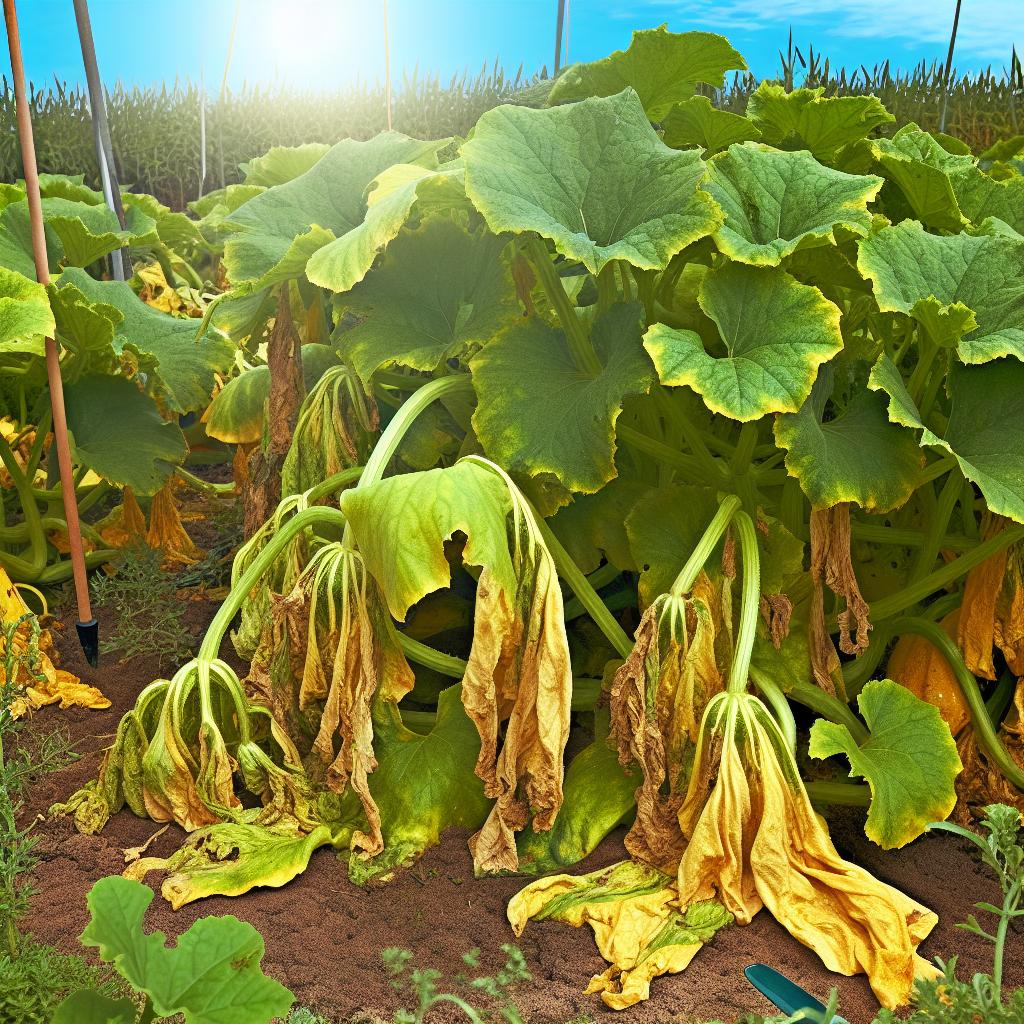Have you ever excitedly planted a beautiful squash garden, only to find your plants wilting and struggling to survive? If so, you’re not alone. Many gardeners face the frustration of wilted squash plants, but fear not! In this article, we’ll explore the common reasons behind squash plant wilting and provide you with practical solutions to help your garden thrive. So, grab a cup of tea and let’s dive into the world of squash plant care!
Table of Contents
- Common Causes of Squash Plant Wilting
- Identifying and Addressing Pest Infestations
- Understanding and Managing Soil Moisture Levels
- Preventing and Treating Fungal Diseases
- Tips for Maintaining Healthy Squash Plants
- Q&A
- In Conclusion

Common Causes of Squash Plant Wilting
There are several that can leave gardeners scratching their heads. Understanding these causes can help you identify and address the issue before it’s too late. Here are some of the most common reasons why your squash plants may be wilting:
- Poor soil drainage
- Overwatering or underwatering
- Pests or diseases
- Extreme temperatures
- Nutrient deficiencies
It’s important to closely monitor your squash plants and take note of any changes in their appearance or behavior. By identifying the cause of wilting early on, you can take the necessary steps to revive your plants and ensure a healthy harvest.
Identifying and Addressing Pest Infestations
If you’ve noticed your squash plants wilting, it could be a sign of a pest infestation. is crucial for the health and productivity of your garden. Here are some common pests that could be causing your squash plants to wilt:
- Aphids: These small, soft-bodied insects can suck the sap from your squash plants, causing them to wilt and become stunted.
- Squash bugs: These pests feed on the sap of squash plants, causing wilting and yellowing of the leaves.
- Vine borers: The larvae of these pests bore into the stems of squash plants, causing wilting and eventual death of the plant.
To address a pest infestation in your squash plants, consider the following steps:
- Inspect your plants regularly for signs of pests, such as wilting, yellowing, or holes in the leaves.
- Remove any affected plants or plant parts to prevent the spread of pests to healthy plants.
- Use organic pest control methods, such as neem oil or insecticidal soap, to treat the infestation and protect your squash plants.
By early, you can protect your squash plants and ensure a healthy and bountiful harvest.
Understanding and Managing Soil Moisture Levels
Soil moisture levels play a crucial role in the health and growth of your plants. If your squash plants are wilting, it could be a sign of improper soil moisture levels. is essential for the success of your garden. Here are some tips to help you maintain the right soil moisture for your squash plants:
- Use a moisture meter to regularly check the moisture levels in the soil.
- Water your squash plants deeply and infrequently to encourage deep root growth.
- Consider using mulch to help retain soil moisture and prevent evaporation.
- Adjust your watering schedule based on the weather and the specific needs of your squash plants.
By paying attention to soil moisture levels and making adjustments as needed, you can help prevent wilting and promote healthy growth in your squash plants.

Preventing and Treating Fungal Diseases
If you’ve noticed your squash plants wilting, it could be a sign of a fungal disease. Fungal diseases can wreak havoc on your garden, but there are steps you can take to prevent and treat them. Here are some tips to keep your squash plants healthy and thriving:
– **Proper watering**: Avoid overwatering your squash plants, as this can create the damp conditions that fungi love. Water at the base of the plants in the morning to allow the leaves to dry out during the day.
– **Good air circulation**: Make sure your squash plants have plenty of space between them to allow for good air circulation. This can help prevent the spread of fungal spores.
– **Mulch**: Use mulch around your squash plants to help keep the soil moist and prevent splashing, which can spread fungal spores.
In addition to these preventative measures, there are also treatments you can use if you suspect your squash plants have a fungal disease. Consider using organic fungicides or homemade remedies such as neem oil or a baking soda solution. Be sure to remove and dispose of any infected plant material to prevent the spread of the disease. By taking these steps, you can help keep your squash plants healthy and free from fungal diseases.
| Proper Watering | Avoid overwatering to prevent damp conditions |
| Good Air Circulation | Space plants for good air flow |
| Mulch | Use mulch to keep soil moist and prevent spore spread |

Tips for Maintaining Healthy Squash Plants
If you’re noticing your squash plants wilting, there are a few common reasons why this might be happening. Here are some to prevent wilting and ensure a bountiful harvest:
- Watering: Make sure your squash plants are receiving adequate water, especially during hot and dry periods. Water deeply and consistently to keep the soil evenly moist.
- Soil quality: Check the soil pH and nutrient levels to ensure they are suitable for squash plants. Amend the soil with organic matter such as compost to improve its structure and fertility.
- Pest and disease control: Keep an eye out for common squash pests and diseases such as squash bugs, powdery mildew, and vine borers. Use organic pest control methods and disease-resistant varieties to prevent infestations and infections.
In addition to these tips, it’s important to provide adequate support for your squash plants, such as trellising for vining varieties, and to monitor for any signs of stress or nutrient deficiencies. By following these guidelines, you can help your squash plants thrive and avoid wilting issues.
| Tip | Water deeply and consistently |
| Tip | Amend soil with compost |
| Tip | Use organic pest control methods |
Q&A
### Why are my squash plants wilting?
**Q: What are the common causes of wilting in squash plants?**
A: There are several potential reasons for squash plants wilting, including overwatering, underwatering, pests, diseases, and environmental stress.
**Q: How can overwatering cause squash plants to wilt?**
A: Overwatering can lead to root rot, which prevents the roots from absorbing nutrients and water, causing the plants to wilt.
**Q: What are the signs of underwatering in squash plants?**
A: Signs of underwatering in squash plants include drooping leaves, dry soil, and slow growth.
**Q: How can pests and diseases cause squash plants to wilt?**
A: Pests such as squash bugs and diseases like powdery mildew can weaken the plants, leading to wilting and other symptoms.
**Q: What environmental stressors can cause squash plants to wilt?**
A: Environmental stressors such as extreme heat, cold, or humidity can cause squash plants to wilt as they struggle to adapt to their surroundings.
**Q: How can I prevent wilting in my squash plants?**
A: Proper watering, regular inspection for pests and diseases, and providing a suitable growing environment can help prevent wilting in squash plants.
In Conclusion
In conclusion, wilting squash plants can be a common issue for many gardeners, but with the right knowledge and care, it is a problem that can be easily addressed. By understanding the potential causes of wilting, such as overwatering, pests, or diseases, and taking proactive measures to address these issues, you can help your squash plants thrive and produce a bountiful harvest. Remember to monitor your plants closely, provide proper watering and nutrition, and promptly address any signs of distress. With a little attention and care, your squash plants will be flourishing in no time. Happy gardening!

